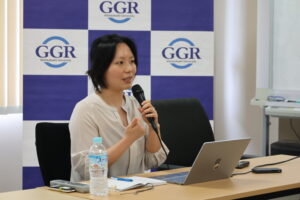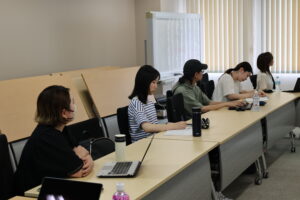On June 27, 2025, the Institute for Global Governance Research (GGR) at Hitotsubashi University held the 40th Brown Bag Lunch Seminar titled “Refugee Protection and the Role of Civil Society: A Comparative Study of Japan and South Korea.” The seminar featured Ms. Jeong Minhee, a doctoral student at the Graduate School of Law, Hitotsubashi University, as a lecturer. Her presentation was based on an article co-authored with Dr. Choi Won Geun (Assistant Professor, Department of Political Science, Hankuk University of Foreign Studies), entitled “Refugee protection and the role of civil society: a comparative study of Japan and South Korea” (The Pacific Review, Vol. 38, No. 4, 2024).
Ms. Jeong focused on the implementation of refugee protection policies at multiple levels in Japan and South Korea, analyzing both similarities and differences. As shared features, she highlighted the strategic adoption of international refugee law and a societal reluctance to accept refugees through economic support. In both countries, refugee status recognition remains extremely limited, and despite fluctuations in the number of applications, the number of recognized refugees has remained consistently low, demonstrating what she referred to as an “invisible wall.” For instance, while the number of asylum applications in South Korea has increased in recent years, the number of individuals granted refugee status has remained around 100.
She then examined key differences between the two countries, with particular attention to the role of civil society. In Japan, civil society has largely taken a top-down, complementary approach, supporting the domestic adoption of global norms by cooperating with governmental bodies. For example, organizations such as the Forum for Refugees Japan and the Japan Federation of Bar Associations have worked with the Ministry of Justice to implement Alternatives to Detention (ATD), providing emergency shelters for asylum seekers at airports. This initiative, fully launched in 2014, was the first of its kind in East Asia and part of a campaign led by the International Detention Coalition.
In contrast, civil society in South Korea has often adopted a bottom-up approach. This more adversarial stance has challenged the government and contributed to improvements in the fairness and transparency of the refugee recognition process. One notable example is the enactment of the Refugee Act in 2011, which marked a shift in the country’s refugee policy from a border-control framework to one based on humanitarian principles and refugee rights. Civil society organizations have also played a key role in monitoring procedural integrity. Due to their advocacy, the Ministry of Justice made the audio and video recording of refugee interviews mandatory from July 2018 onward.
The seminar concluded with a lively Q&A session, covering topics such as public perceptions of refugee admissions in South Korea, the relationship between North Korean escapees and other refugee groups, differences in Japan and South Korea’s engagement with the United Nations, the efficacy of advocacy efforts, and the role of local communities in refugee reception.
【Event report prepared by】
Nakajima Takahiro (Master’s student, Graduate School of Law, Hitotsubashi University)
 |
 |
